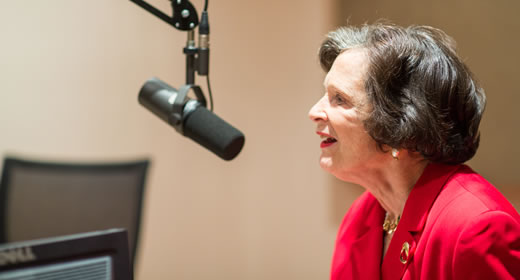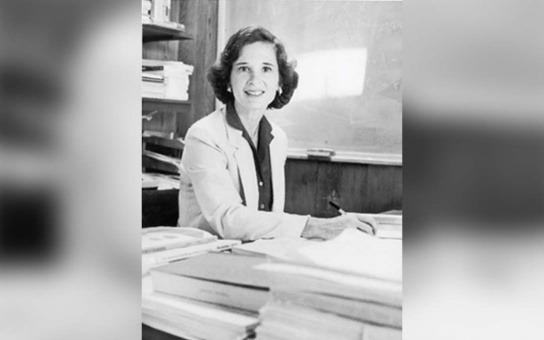
In the first days of Donald J. Trump's presidency, journalists from across the world called Marina Whitman. They wanted to discuss the implications of Trump's meetings with auto executives. They wanted to understand how Trump's proposed tariff on Mexican imports might impact the U.S. economy. And they wanted to discuss protectionism more broadly.
Whitman's curriculum vitae as an international economist has a lot to do with those requests.
As a young professor at the University of Pittsburgh, Whitman took a leave of absence to become the first female economist on the Council of Economic Advisers (CEA) in 1972.
At the CEA, Whitman was responsible for advising President Richard Nixon on a wide range of economic topics, including trade, international economic development, transportation, and more. Today, 22 boxes of her work—more than 17,000 pages—are preserved in the Nixon Presidential Library.
After resigning from the CEA as Nixon's Watergate involvement became clear, Whitman returned to Pittsburgh and proceeded to join several of the most prestigious institutions influencing trade agreements and international reforms. Then in 1979, Whitman was hired as GM's chief economist. Whitman and her staff followed and forecasted global economic conditions, and advocated against protectionist auto industry policies. In time, she was promoted to serve as group vice president of public affairs—a title that placed her among the highest ranking female business leaders anywhere.
It's clear—from Whitman's media interviews, from her recent op-eds in the Detroit Free Press, and from conversations with her in Weill Hall—that Whitman's perspective on contemporary trade policies is sought out by the media because it's grounded in economics, attuned to business interests, and deeply informed by decades of work with influential global organizations like the Council on Foreign Relations.
Removing barriers to trade has been a "win-win," she says now, conferring benefits in the U.S. and abroad. "The pace at which poverty has gone down in the developing world [largely as a result of trade] is nothing short of remarkable."

At the same time, Whitman acknowledges that advocates of liberalized trade have failed a sizeable subset of the U.S. population—and that those oversights were likely a critical factor in the recent Presidential election.
"While [economists] have been unanimous on the aggregate advantages of trade liberalization, we haven't paid enough attention to the losers," says Whitman. "There are many more winners than losers, but the losers feel it much more personally and intensely. And neither my profession nor the government has done enough to try to assuage some of the difficulties that [they] face."
Whitman continues to advocate for free trade—most recently arguing that it has played an important role in building and buttressing Pax Americana. But she is perhaps best known to recent Ford School students for her expertise on corporate social responsibility (CSR). Since joining the faculty some 25 years ago, Whitman has taught "International Trade" and "Global Corporate Social Responsibility" to hundreds of students at the Ford School and Ross School of Business.
Although American firms have practiced CSR for more than a century, Whitman says the answers to key questions, like "what are managers responsible for?" "to whom?" and "why?" have continued to evolve. Increased competition, from deregulation and global trade, have changed business norms, encouraging companies to prioritize shareholder returns over workers and communities.
Despite this shift, however, Whitman notes that American companies are increasingly interested in acting more responsibly.
"There's always the tradeoff between the positive impacts of a company—in creating jobs, wages, and taxes—and the negative externalities," says Whitman. "A lot of CSR is trying to minimize those externalities." Nike, Walmart, Apple, and Best Buy—among others—increasingly intervene throughout their global supply chains to improve factory working conditions. Other companies now track and seek to minimize their environmental footprints.
While empirical research has found it difficult to prove definitively that firms "do well by doing good"—a central question to CSR, but a difficult one to answer given the complexity of firms and markets—Whitman makes a strong case to her students, drawing on numerous case studies, research articles, and her own research and professional experiences. As a result, generations of students have graduated believing firms can.
Jeremy Jepson (MPP '04), director of public affairs and corporate citizenship at Walt Disney Parks and Resorts, is one of those graduates. "Marina's background and experience have been invaluable to Ford students interested in the intersection of policy and business," he says. "She's been a resource and inspiration to me for more than a decade."
By Anthony Cozart (MPP '18) for State & Hill, the magazine of the Gerald R. Ford School of Public Policy
Below is a formatted version of this article from State & Hill, the magazine of the Ford School. View the entire Spring 2017 State & Hill here.
